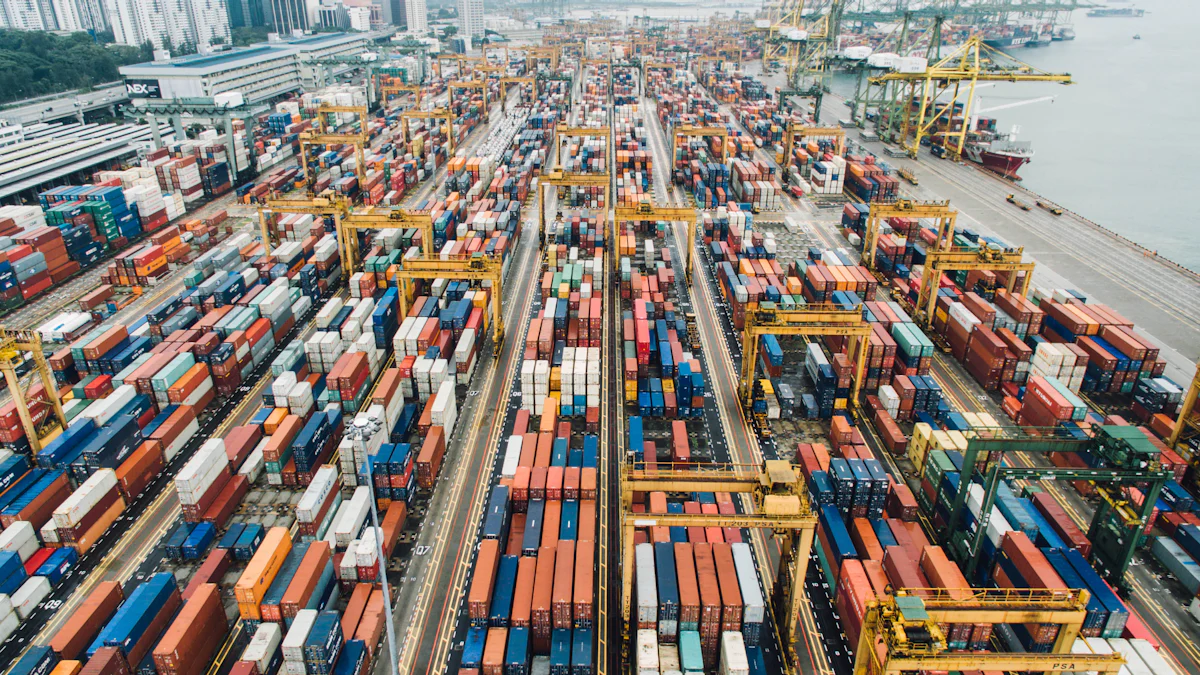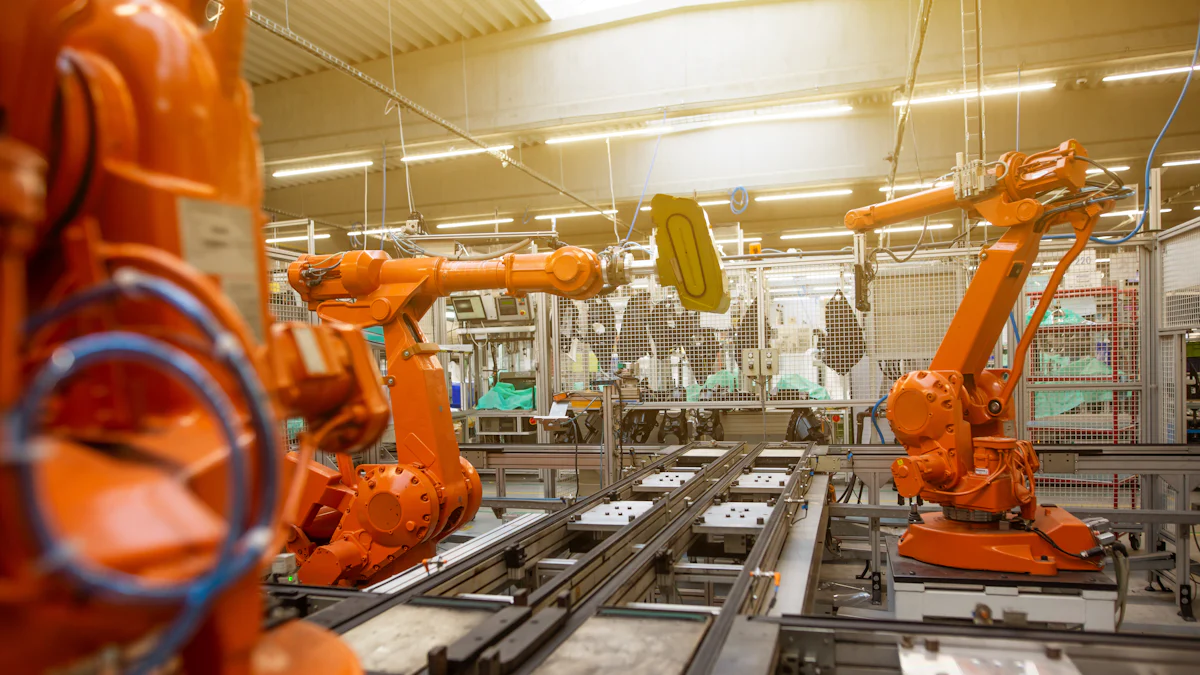2024 Insights: The Future Impact of AI on Smart Supply Chains

Artificial Intelligence (AI) and smart supply chains signify a major leap forward in logistics and procurement. Gaining 2024 insights into future trends in this field is essential for businesses striving to maintain a competitive edge. This blog aims to delve into the impact of AI on smart supply chains in 2024, offering valuable insights into how these technologies will transform the industry.
2024 Insights: Technological Advancements in AI
Machine Learning and Predictive Analytics
Enhancements in Demand Forecasting
Machine learning algorithms analyze vast amounts of historical data to predict future demand with high accuracy. Businesses can adjust production schedules based on these insights, reducing overproduction and stockouts. AI-driven systems provide predictive analytics, seasonal adjustments, and market insights for supply chain optimization. Enhanced demand forecasting minimizes waste and ensures that products are available when needed.
Optimization of Inventory Management
AI optimizes inventory management by using predictive models to forecast future demand. This approach helps companies maintain optimal inventory levels, reducing holding costs and avoiding stockouts. The "JUSDA Artificial Intelligence Inventory Management Technology Research Project" demonstrates how AI can provide real-time replenishment and shipping suggestions. These advancements help businesses manage inventory dynamically, leading to significant cost savings.
Internet of Things (IoT) Integration
Real-time Data Collection
IoT devices collect real-time data from various points in the supply chain. Sensors on shipping containers, warehouses, and delivery vehicles provide continuous updates on location, temperature, and other critical parameters. This data allows companies to monitor and respond to changes instantly, enhancing supply chain visibility and efficiency. Real-time data collection enables proactive decision-making, reducing delays and disruptions.
Improved Asset Tracking
IoT integration improves asset tracking by providing precise location data for goods in transit. Companies can monitor the movement of products from manufacturing to delivery, ensuring timely arrivals. Improved asset tracking reduces the risk of loss or theft and enhances overall supply chain security. Accurate tracking information also supports better inventory management and customer satisfaction.
Robotics and Automation
Automated Warehousing
Robotics and automation transform warehousing operations by performing repetitive tasks with high precision. Automated systems handle sorting, packing, and moving goods within warehouses, increasing efficiency and reducing labor costs. AI-powered robots work alongside human workers, enhancing productivity and accuracy. Automated warehousing leads to faster order fulfillment and improved inventory control.
Autonomous Delivery Systems
Autonomous delivery systems use AI and robotics to transport goods without human intervention. Drones and self-driving vehicles deliver packages quickly and efficiently, especially in urban areas. These systems reduce delivery times and operational costs while minimizing human error. Autonomous delivery systems represent a significant advancement in logistics, offering a glimpse into the future of supply chain management.
Practical Applications of AI in Smart Supply Chains

Supply Chain Planning
Dynamic Routing and Scheduling
AI optimizes routing and scheduling by analyzing real-time data. This approach reduces transportation costs and improves delivery times. Machine learning algorithms adjust routes based on traffic conditions, weather, and other variables. Companies benefit from increased efficiency and reduced fuel consumption. Dynamic routing enhances overall supply chain performance.
Supplier Relationship Management
AI enhances supplier relationship management through predictive analytics. Businesses can assess supplier performance and identify potential risks. AI tools provide insights into supplier reliability and quality. Companies can make informed decisions about sourcing and procurement. Improved supplier management leads to stronger partnerships and more resilient supply chains.
Production and Manufacturing
Quality Control and Defect Detection
AI-driven systems improve quality control in manufacturing. Machine learning algorithms detect defects in real-time during the production process. This technology reduces waste and ensures high-quality products. Automated quality control minimizes human error and increases efficiency. Companies achieve better product consistency and customer satisfaction.
Predictive Maintenance
AI enables predictive maintenance by analyzing equipment data. This approach identifies potential issues before they cause failures. Predictive maintenance reduces downtime and extends the lifespan of machinery. Companies save on repair costs and improve operational efficiency. AI-driven maintenance strategies enhance overall production reliability.
Logistics and Distribution
Route Optimization
AI optimizes logistics by improving route planning. Machine learning algorithms analyze various factors to determine the best delivery routes. This technology reduces transportation costs and improves delivery times. Companies benefit from increased efficiency and lower fuel consumption. Route optimization enhances overall supply chain performance.
Last-Mile Delivery Solutions
AI transforms last-mile delivery with innovative solutions. Autonomous vehicles and drones deliver packages quickly and efficiently. This technology reduces delivery times and operational costs. AI-driven systems ensure accurate and timely deliveries. Companies achieve higher customer satisfaction and improved logistics efficiency.
Benefits of AI in Smart Supply Chains
Increased Efficiency and Productivity
Reduced Operational Costs
AI-driven systems streamline operations, leading to significant cost reductions. Machine learning algorithms optimize processes such as inventory management and logistics. Companies report a 15% reduction in logistics costs due to AI tools. Automated systems reduce labor costs by handling repetitive tasks with high precision. Predictive analytics minimize waste, further cutting operational expenses.
Faster Decision-Making
AI enhances decision-making speed by providing real-time data analysis. Businesses can quickly adapt to changing market conditions. Machine learning models offer insights that enable rapid adjustments in production schedules and supply chain routes. Faster decision-making improves overall efficiency and responsiveness. Companies gain a competitive edge through timely and informed actions.
Enhanced Customer Satisfaction
Improved Order Accuracy
AI improves order accuracy by automating order processing and fulfillment. Machine learning algorithms ensure precise inventory tracking and management. Companies achieve higher accuracy rates, reducing errors in order fulfillment. Improved order accuracy leads to increased customer satisfaction. Businesses build stronger relationships with customers through reliable service.
Faster Delivery Times
AI optimizes delivery routes, resulting in faster shipping times. Autonomous delivery systems, such as drones and self-driving vehicles, expedite the last-mile delivery process. Companies report a 65% improvement in service levels due to AI integration. Faster delivery times enhance customer satisfaction and loyalty. Businesses meet customer expectations for quick and efficient service.
Greater Flexibility and Resilience
Adaptability to Market Changes
AI enables supply chains to adapt swiftly to market fluctuations. Predictive analytics provide insights into emerging trends and potential disruptions. Companies can adjust their strategies based on real-time data. AI-driven systems enhance flexibility by allowing dynamic adjustments in production and logistics. Businesses remain resilient in the face of market volatility.
Risk Mitigation
AI helps mitigate risks by identifying potential issues before they escalate. Machine learning models analyze data to detect anomalies and predict failures. Companies can take proactive measures to address risks, reducing downtime and losses. AI enhances supply chain security by improving asset tracking and monitoring. Businesses achieve greater resilience through effective risk management.
Challenges and Considerations
Data Privacy and Security
Protecting Sensitive Information
AI systems in supply chains handle vast amounts of sensitive data. Companies must implement robust security measures to protect this information. Encryption and access controls can safeguard data from unauthorized access. Regular security audits help identify vulnerabilities and ensure data integrity. Protecting sensitive information maintains customer trust and compliance with industry standards.
Compliance with Regulations
Regulatory compliance is crucial for AI implementation in supply chains. Companies must adhere to data protection laws such as GDPR and CCPA. Non-compliance can result in hefty fines and legal repercussions. Businesses should establish clear policies and procedures for data handling. Regular training ensures employees understand and follow these regulations. Compliance with regulations fosters a secure and trustworthy supply chain environment.
Implementation Costs
Initial Investment
The initial investment in AI technology can be substantial. Companies need to allocate funds for software, hardware, and infrastructure upgrades. Budgeting for these expenses is essential for a successful AI implementation. Financial planning should include cost-benefit analysis to justify the investment. Initial investment in AI can lead to long-term savings and efficiency gains.
Ongoing Maintenance
AI systems require continuous maintenance and updates. Companies must budget for ongoing costs such as software licenses and technical support. Regular system updates ensure AI tools remain effective and secure. Maintenance also involves monitoring system performance and addressing any issues promptly. Ongoing maintenance is crucial for sustaining the benefits of AI in supply chains.
Workforce Adaptation
Training and Skill Development
AI integration necessitates workforce training and skill development. Employees need to understand how to use new AI tools effectively. Training programs should cover both technical skills and AI-related concepts. Investing in employee education enhances overall productivity and job satisfaction. Continuous learning opportunities keep the workforce adept at handling evolving AI technologies.
Managing Workforce Transition
Transitioning to AI-driven processes can be challenging for the workforce. Companies must manage this change carefully to minimize disruption. Clear communication about the benefits and goals of AI integration helps ease concerns. Support systems such as counseling and career development programs assist employees during the transition. Managing workforce transition effectively ensures a smooth shift to AI-enhanced supply chains.
Future Implications and Trends

Evolution of AI Technologies
Emerging Innovations
AI technologies will continue to evolve rapidly. New innovations will emerge, enhancing the capabilities of smart supply chains. Generative AI will revolutionize supply chain management, logistics, and procurement. Businesses will need to re-evaluate their current supply chain analytics teams to prepare for AI upgrades. The AI market is expected to grow by at least 120% year-over-year, expanding at a CAGR of 38.1% between 2022 and 2030. This growth will drive the development of advanced AI tools and applications.
JusLink AI, developed by Jusda Technology, is an advanced AI-driven collaborative intelligent supply chain management system. It addresses various pain points in supply chain management, enabling manufacturing companies to achieve comprehensive intelligent development. The system offers end-to-end supply chain visibility, collaboration advantages, and capabilities, providing a fully integrated digital supply chain solution.

SMART JusLink
Supply Chain Management Solution
One of the notable AI products within the JusLink platform is the JusAI Intelligent Dialogue Engine. This engine integrates large language models to revolutionize traditional logistics operations. Users can access a single window, perform one-click Q&A, and view all interactions with the chatbot, obtaining required services accurately, rapidly, and at low cost. This innovation brings an unprecedented service experience, opening the door to a new world of intelligent supply chain management.
Additionally, JusLink's AI capabilities extend to dynamic ETA (Estimated Time of Arrival) intelligent algorithms, which utilize machine learning, neural network models, and extensive vessel data to predict arrival times at destination ports more accurately. This significantly enhances supply chain operational efficiency by providing timely and accurate logistics anomaly warnings, improving operational efficiency, reducing costs, and mitigating the risk of supply chain disruptions.
Long-term Projections
Long-term projections indicate a significant increase in AI adoption. The AI market is projected to reach $407 billion by 2027, up from $86.9 billion in 2022. AI patent grants have increased more than 31 times since 2010, reflecting the rapid pace of innovation. AI will improve employee productivity by 40% and boost business revenues by 6% to 10%. These advancements will lead to more efficient, resilient, and responsive supply chains.
Strategic Planning for Businesses
Preparing for AI Integration
Businesses must prepare for AI integration by investing in technology and infrastructure. Companies should allocate funds for software, hardware, and system upgrades. Financial planning should include a cost-benefit analysis to justify the investment. Training programs will be essential to equip employees with the necessary skills to use AI tools effectively. Continuous learning opportunities will keep the workforce adept at handling evolving AI technologies.
Developing AI-driven Strategies
Developing AI-driven strategies will be crucial for businesses. Companies should focus on leveraging AI to optimize supply chain operations. AI tools can enhance demand forecasting, inventory management, and logistics. Businesses should establish clear policies and procedures for data handling to ensure compliance with regulations. Strategic planning will help companies remain competitive in an AI-driven future.
Global Impact on Supply Chains
International Trade and Collaboration
AI will have a profound impact on international trade and collaboration. AI-driven systems will provide end-to-end visibility and collaboration across global supply chains. Enhanced predictive analytics will improve demand forecasting and inventory optimization. AI will enable more efficient and secure international trade, reducing delays and disruptions. Companies will benefit from stronger partnerships and more resilient supply chains.
Sustainable Practices
AI will play a critical role in promoting sustainable practices. AI tools can optimize resource usage and reduce waste in supply chain operations. Predictive maintenance will extend the lifespan of machinery, reducing the need for replacements. AI-driven systems will enhance supply chain security by improving asset tracking and monitoring. Sustainable practices will contribute to a more environmentally friendly and efficient supply chain.
The blog has explored the transformative potential of AI in smart supply chains. AI enhances decision-making and efficiency in supply chain operations. AI-driven insights improve demand forecasting, logistics optimization, and task automation. These advancements contribute to cost savings, increased productivity, and improved responsiveness. Businesses must prepare for AI integration by investing in technology and training. AI will revolutionize supply chain management, making it more resilient and agile. Adopting AI technologies will be crucial for maintaining a competitive edge in the future.
See Also
Revealing Tomorrow's Supply Chain: AI Fusion Perspectives
Maximizing Productivity: AI Logistics Advancements
Artificial Intelligence in Supply Chain: Transforming Future Transportation
Improving Logistics Networks: Big Data Influence Exposed
Data-driven Discoveries: Transforming Supply Chain Operations through ML
